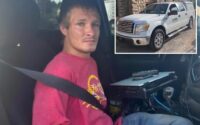Woman indicted for selling stolen body parts for $11K to a man she met on Facebook
An Arkansas woman pleaded not guilty to charges she sold stolen body parts from medical school corpses for $11,000 to a Pennsylvania man she met on social media.
Candace Chapman Scott, 36, a former mortuary worker, is accused of selling 20 boxes of body parts to a man she met through a Facebook group about “oddities,” according to the April 5 indictment unsealed Friday in federal court in Little Rock.
Scott pleaded not guilty to 12 counts, including conspiracy to commit mail fraud, mail fraud, conspiracy to commit wire fraud, wire fraud, conspiracy to commit interstate transportation of stolen property and interstate transportation of stolen property.
She remains in jail as she awaits a hearing scheduled for Tuesday on whether she will be released on bail.
The man who allegedly purchased the remains was not named in the federal indictment. But he was identified as Jeremy Lee Pauley in separate state charges.
Scott worked at Arkansas Central Mortuary Services, a funeral home, and part of her job included transporting, cremating and embalming remains. According to the University of Arkansas for Medical Sciences in Little Rock, the funeral home is where the medical school sent remains of cadavers that had been donated for medical students to examine.
In October 2021, Scott allegedly approached Pauley and began offering to sell him remains from the medical school that the mortuary needed to cremate and return.
“Just out of curiosity, would you know anyone in the market for a fully in tact, embalmed brain?” Scott wrote to Pauley in her first Facebook message, according to the indictment.

In the next nine months, Scott sold Pauley fetuses, brains, hearts, lungs, genitalia, large pieces of skin and other body parts, the indictment alleges. The indictment claims that, in one incident, Scott sold the remains of a fetus at a discount because “he’s not in great shape.”
In another message from Dec. 2, 2021, the indictment said Scott offered to sell Pauley “2 brains, one with skullcap, 3 hearts one cut, 2 fake boobies, one large belly button piece of skin, [one] arm, one huge piece of skin, and one lung” for $1,600. Scott received a payment from Pauley through PayPal that same day for $1,600.
Scott collected $10,975 in 16 separate PayPal transfers, the indictment says.
Prosecutors argue that Scott should remain behind bars until her trial. Assistant U.S. Attorney Amanda Jegley told U.S. Magistrate Judge J. Thomas Ray on Friday that Scott may flee over the prospect of a long prison sentence.
“I think that the facts … underlying the indictment and in the indictment are uniquely egregious and objectionable and we believe there is going to be some significant public outcry as a result of this,” Jegley said.
Ray said the accusations against Scott are “shocking and depraved.” But under federal rules, the judge is only supposed to order Scott to remain jailed if she is a flight risk since she is not considered dangerous.
“The indictment alleges horribly egregious conduct, shocking conduct,” Ray said. “But under the Bail Reform Act, those aren’t factors that I consider for dangerousness that goes to danger to the community or risk of the community. As shocking and depraved as the alleged conduct is, none of that would go toward dangerousness so the only thing I see here that would support a request for detention is obviously flight risk.”‘

Pennsylvania officials learned of the transactions after they received complaints last year about Pauley.
Pauley is charged in Pennsylvania with a misdemeanor count of abuse of a corpse, a felony count of receiving stolen property, a misdemeanor count of receiving stolen property and a felony count of dealing in proceeds of unlawful activities. He is free on bail and his preliminary hearing is scheduled for June 7.
University of Arkansas for Medical Sciences spokeswoman Leslie Taylor told the Arkansas Democrat-Gazette that the FBI has not revealed to school officials whether any of the remains have been identified. She said embalming damages DNA, which makes identification extremely difficult.
Taylor said the medical school still contracts with Arkansas Central Mortuary Services.
The Associated Press contributed to this report.


